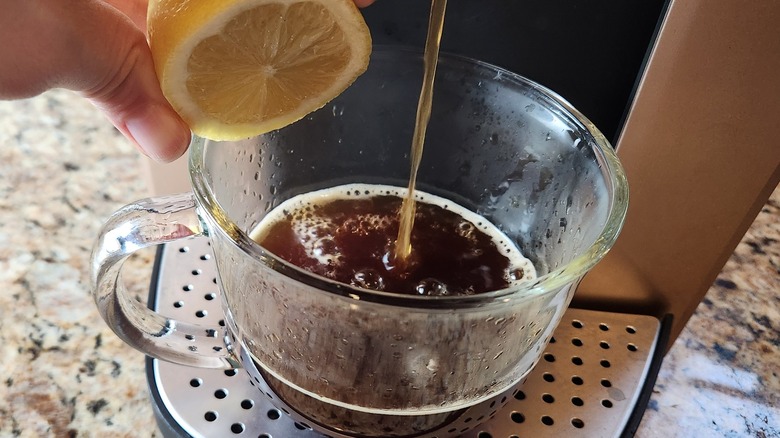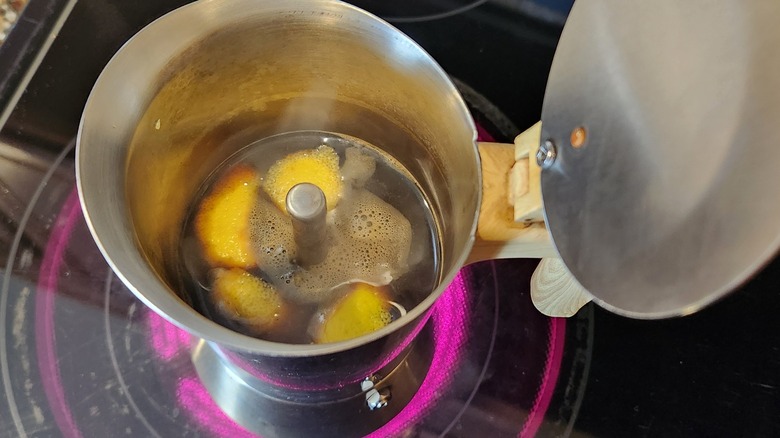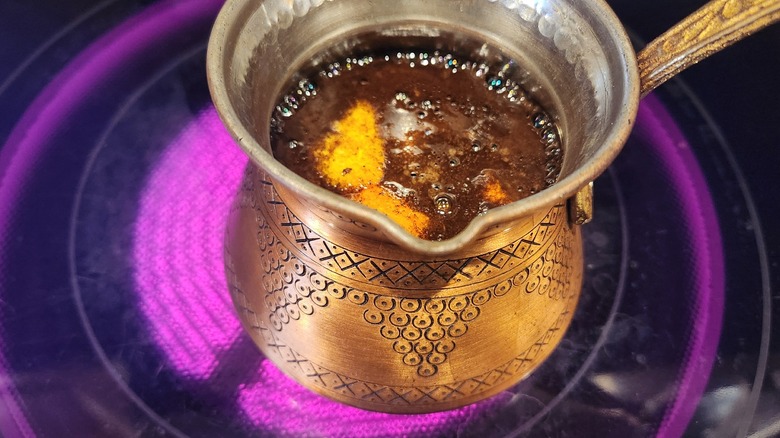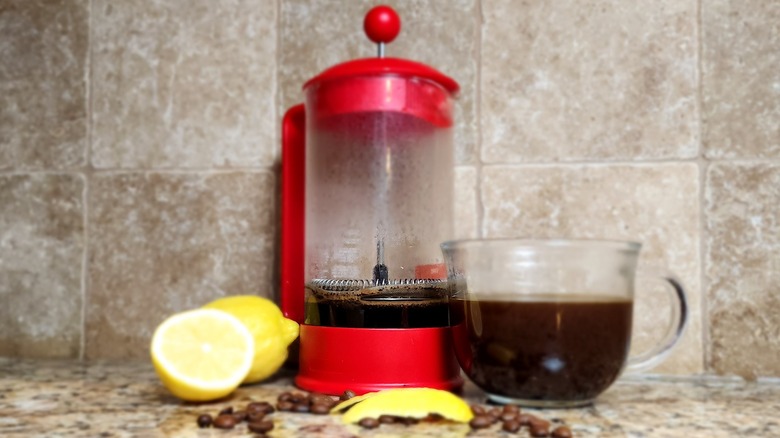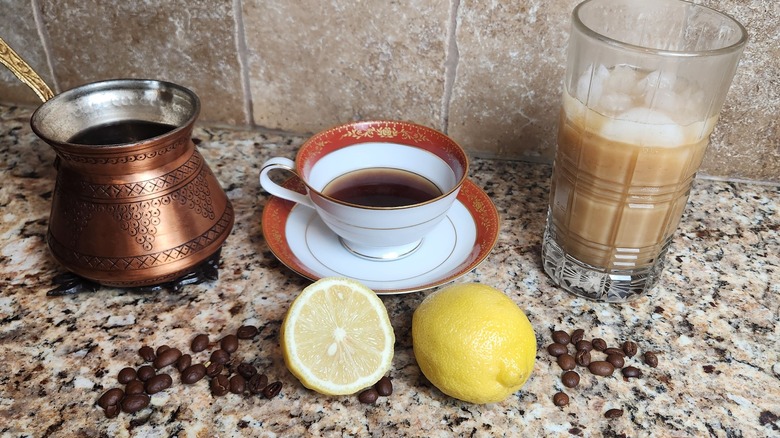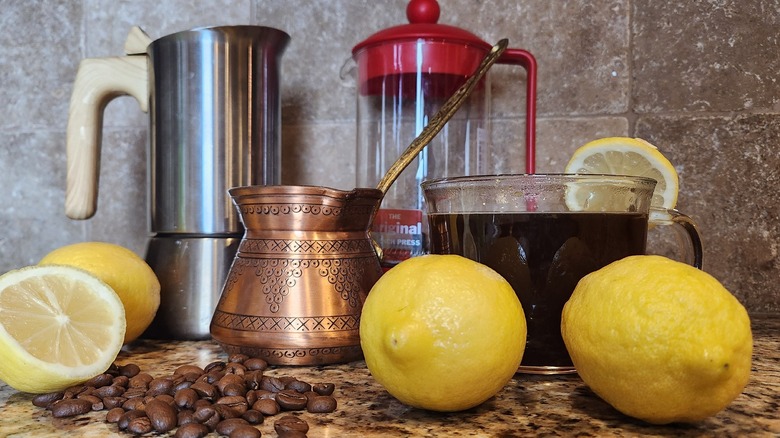The Viral Lemon Coffee Trend That Took TikTok By Storm
Lemon coffee has been all over TikTok and other social media, but is it worth the hype? Some people are trying it for the flavor, while others are trying it because of unfounded claims that it will help them lose weight. Unfortunately, a lot of the people making it to lose weight are acting like it's something to choke down quickly rather than a drink that tastes good. Having tried lemon extract in our coffee and liked it, we thought we'd do some experiments to see how to make lemon coffee taste good with real lemon. The hope was that, if we got it right, we'd create a lemon coffee drink that was just as good as other favorite lemon confections.
The method you use to make lemon coffee matters. So, we tried six different coffee-making methods. We also decided to try infusing the coffee with real lemon in different ways, such as adding a teaspoon of lemon juice, a pinch of lemon zest, or four small pieces of fresh lemon peel. We also wanted to try all the lemon coffees with cream. However, dairy curdles when you add lemon, so we used oat milk instead since it's one of the creamiest non-dairy milks. Plus, it's neutral enough not to affect the overall flavor like coconut milk would.
Not every experiment we tried worked. However, in the end, we found two amazing versions of lemon coffee that you'll want to try along with several other decent versions.
Keurig coffee with lemon
Our concern was that Keurig makes such weak coffee that the lemon flavor might be overwhelming. However, we were pleased with some of the results. Keurigs are a wonder of an invention. Just pop a pod in, press a button, and you have mess-free coffee in just a few seconds. It's one of the fastest ways to make passable lemon coffee.
We weren't feeling very confident with lemon Keurig coffee after adding a teaspoon of lemon juice. It was fairly horrible. Even adding some sugar didn't help. However, after we added oat milk to the lemon juice and sugar, it was a fairly decent drink.
Using a pinch of lemon zest instead of juice was a positive change. It still wasn't great unsweetened, but it was at least an improvement. Sugar didn't help much. When we included oat milk in the mix, it transformed into a good coffee, just like the lemon juice version did. When compared side by side, the sweetened lemon zest cream version had a better and brighter flavor. It's not necessarily a drink to write home about and suggest to everyone you meet, but it's a nice change of pace from plain Keurig coffee. So, if you want to try lemon Keurig coffee, your best bet is to use lemon zest and add non-dairy milk or creamer with your sweetener of choice.
Moka pot lemon coffee
We wondered how the strong flavors of lemon would work with moka pot coffee. Moka pots (or stovetop espresso makers) brew an extremely strong version of coffee. The coffee quickly percolates up through the grounds to make a drink that is slightly weaker than espresso but far stronger than drip coffee. Making lemon coffee with a moka pot yielded mixed results.
Adding a teaspoon of lemon juice to Moka pot coffee is not something we'd recommend in any form. It turned our mouth inside out with bite and bitterness. Sugar made it even more undrinkable. It still tasted horrible with oat milk. Luckily, now that we've revealed how horrible it is, we hope you won't ever feel the need to try it.
The other way we tried it was to add four pieces of lemon peel to the top of the Moka pot. The peels steeped in the coffee for a couple of minutes while the percolation process was happening, but they didn't boil in the coffee. Straight out of the pot, the lemon Moka pot coffee was fairly bitter and not something we'd recommend. Adding sugar only helped it a little. However, pouring in oat milk made it smooth and delicious. In fact, we found the creamy version to be somewhat addictive. Thus, using lemon peels and adding your favorite non-dairy milk and sweetener is the only way you'll want to make lemon moka pot coffee.
Turkish coffee with lemon
Turkish coffee is both strong and smooth, so we didn't know what to expect. Making Turkish coffee involves boiling powdered coffee grounds in water. While it's traditional to use a cezve or ibrik to make Turkish coffee, you can make it with a small kitchen pot. You just need your coffee beans ground into a powder finer than you need for espresso. Interestingly enough, this method resulted in some of the best and worst lemon coffee versions.
Adding lemon juice to Turkish coffee is quite possibly the worst thing you can do to it in our opinion. It's absolutely undrinkable and made us screw up our face in disgust. When we added sugar, it tasted as if we'd added bottled lemon juice. Somehow, oat milk made it even worse. Turkish coffee with lemon juice is the drink you give your enemies. Having no enemies around to foist the drink upon, we poured it straight down the drain.
After such a horror show with the lemon juice version, we weren't very confident about the lemon peel version. However, it ended up being among the best lemon coffee options. To make it, we added four small pieces of lemon peel with our coffee grounds, brought it to a boil, and let it boil an additional minute. It created one of the best unsweetened lemon coffees, with bite but not much bitterness. Adding sugar improved it. Interestingly, adding oat milk turned it into a delightful dessert drink that we wanted to make again and again.
French press lemon coffee
Given our good results with other coffee makers that allowed the grounds to have a fair amount of contact with the water, we were optimistic about French press lemon coffee. A French press allows you to steep coffee grounds in boiling water for three to four minutes. The grounds filter out when you pour it into your coffee cup. The methodology is similar to making tea. Unfortunately, we couldn't find a way to make French press lemon coffee taste good.
We first tried adding lemon juice to French press coffee with results that weren't so great. It started out tasting pretty horrible but not overly tart. Adding sugar made it absolutely vile. It gave it a more lip-puckering flavor that wasn't remotely palatable. Unfortunately, oat milk didn't help at all. The whole experience was a pretty close tie with adding lemon juice to Turkish coffee in how horrible it was. In fact, it may have been the worst coffee we've ever tasted.
Steeping the coffee with lemon peel in it wasn't a huge improvement. It was bitter both with and without sugar. At least it was drinkable with oat milk, but it was still fairly tart and nothing you'd ever want to make on purpose. Overall, making lemon coffee with a French press was a failure, and we can't recommend it.
Instant coffee with lemon
Our hope was that lemon instant coffee would be similar to Turkish coffee since both versions involve dissolving coffee grounds in hot water. Instant coffee is a notoriously inferior coffee type, especially for coffee snobs. But, could lemon transform it? While instant coffee and lemon aren't a perfect marriage, we were pleasantly surprised at some of the results.
If you're considering adding lemon juice to instant coffee, don't. It oddly ended up smelling like chocolate, which made us hopeful. However, it was bitter and undrinkable. Neither sugar nor oat milk helped the flavor. It even gave our teeth an acidic squeakiness that we hadn't experienced with our other experimentations.
The surprising version of lemon instant coffee was the one we made with a pinch of lemon zest. It was one of the most drinkable versions when made plain without a sweetener or whitener. It tastes a little like hot lemonade without sugar. The bitterness comes out a little more when you add sugar, but it's still decent. It was the first one we tried that didn't need the help of oat milk, but it was still good with it. So, if you want to try lemon instant coffee, using zest is your best bet.
Cold brew lemon coffee
After the French press lemon coffee went so badly, we were nervous about trying cold brew coffee with lemon. We mixed up one jar of plain coffee grounds with water and one jar of coffee grounds and lemon peels with water and let it steep in the refrigerator overnight to see how it would taste. While Starbucks' cold brew lemon coffee wasn't a drink TikTok seemed to like, the homemade results for us were among our best.
The first one we tried was plain cold brew coffee mixed with a teaspoon of lemon juice. Without sugar, it tasted like straight-up unsweetened lemonade. Sugar syrup turned it into a drink that was almost indistinguishable from lemonade. Adding oat milk made it even better.
The lemon juice version was good, but the one we steeped with lemon peels was even better. The oils from the peels gave a more vibrant lemonade taste to the unsweetened version. Sugar syrup made it smoother. Meanwhile, oat milk gave it an amazingly crave-worthy, dessert-quality drink similar to the Turkish coffee version. Both the lemon juice and lemon peel cold brew coffees were great, but the one steeped with lemon peel was next level.
Despite claims, it won't help you lose weight
One of the main reasons that lemon coffee has taken TikTok by storm is that there are claims that the drink will help you lose weight. You'll see tons of videos of people choking back horrible versions of the drink like it's medicine with the hopes that it's a wonder drink that's going to make them skinny. If you don't like the way it tastes, don't waste your time because lemon coffee won't help you lose weight any more than regular coffee.
There is some evidence that coffee itself may have some weight-related health benefits. A 2019 study in Scientific Reports indicates that the caffeine in coffee can help increase metabolism and improve your ability to burn carbohydrates and fats. Meanwhile, a 2020 study in Nutrition Research shows mixed results concerning whether or not caffeine helps improve performance with some types of exercise.
So, if you don't usually consume caffeine, you might get some metabolic benefits from coffee, and it may give you better exercise results. However, if you've been drinking coffee all along, there's no reason you should expect any difference with lemon coffee since there aren't any weight-loss benefits related to lemons (via Healthline).
Two methods produced the best lemon coffee flavor
Two versions had the best lemon coffee flavor: coffee cold brewed with lemon peel and Turkish coffee boiled with lemon peel. Both tasted best with sugar and oat milk. So, if you want to try it at its best, these are the best options. We liked the Turkish coffee version slightly better, but it's a close race.
The peel provides a more vibrant and full-bodied flavor than the lemon juice for both the Turkish and cold brew coffees. It's a flavor that's brighter and hits the tongue differently. In both instances, the coffees were easily drinkable even without sugar or oat milk. So, if you like your coffee unsweetened and unwhitened, these are definitely the way to go. The cold-brew version tastes more like lemonade if you make it without a creamy ingredient. However, if you like your coffee dessert style with plenty of creamy sweetness, these are also your best bets. You really can't go wrong with them.
Our verdict on lemon coffee is that it can be amazing or horrible
If you've seen TikTok videos of people proclaiming that lemon coffee is amazing and that it's horrible, both are true. It just depends on how you make your drink. We didn't find any common denominators to help us determine whether a method would be good or bad. However, cold brew and Turkish coffee made with lemon peels were the most outstanding of the bunch and well worth trying if you like lemon-flavored drinks and confections.
Our experiments most often yielded bad results when we made the coffee with lemon juice instead of lemon zest or lemon peel. The only ones we added lemon juice to that turned out good were the cold brew version and the Keurig version with sugar and oat milk. The versions we made with lemon zest or lemon peel tended to be the best overall. However, the lemon peel moka pot version wasn't good until we added sugar and oat milk, and the French press version was vile to the core.
So, if you have a coffee maker type we didn't try here, we suggest adding fresh peels during the brewing process or a pinch of zest after the brewing process. If it doesn't meet with your approval, try adding sweetener and non-dairy milk or cream.
We also tried our favorite method for making orange coffee
Turkish lemon coffee was the absolute best of all the coffees we tried, so we decided to attempt making orange coffee with our Turkish coffee pot to see how that would turn out. You might have heard of orange coffee as being a favorite of Ashton Kutcher. While he puts orange juice into his coffee, we decided to try boiling orange peel with our Turkish coffee since lemon peels tasted so good with it.
Having hated orange juice in coffee when we tried it a few years back, we weren't sure what to expect. However, we were blown away by the flavor of orange peel Turkish coffee (in a good way). Straight from the pot, it didn't even taste like coffee. It was more like orange tea. Strangely enough, it was better without sugar, which added tanginess to it. Adding oat milk wasn't even necessary, which is a rarity for this creamy coffee lover. Since Turkish coffee often comes with cardamom, we decided to add a pinch to see what it would do to the flavor. With cardamom, it took it to the next level, giving it a holiday-adjacent flavor perfect for a winter beverage treat.
While we're still hung up on lemon Turkish coffee, orange Turkish coffee is pretty special, too. So, next time you're making Turkish coffee, don't be shy about throwing an orange peel into the mix for something special.

